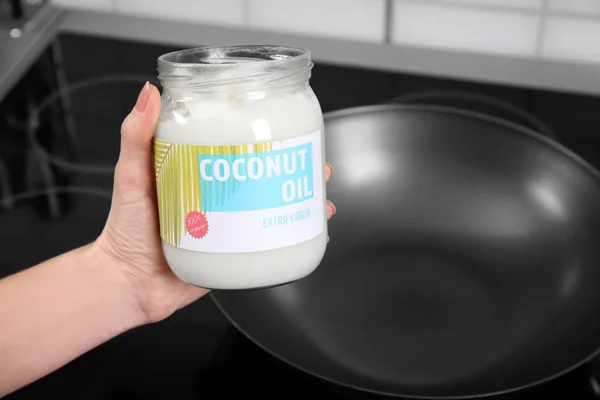Coconut Oil in Your Diet: Superfood or Risky Choice? Here’s What You Need to Know
Coconut oil has become a household name in the world of health and wellness, praised for its versatility and numerous benefits. From cooking to skincare, this tropical oil seems to offer a wide range of advantages. However, like many health trends, coconut oil isn’t as straightforward as it may seem.
While it has undeniable benefits, there are also some risks to consider, especially when it comes to incorporating it into your diet regularly.
So, is coconut oil a superfood or just a passing fad? Let’s dive into the pros and cons to help you make an informed decision.
The Benefits of Coconut Oil in Your Diet
Boosts Heart Health with Medium-Chain Triglycerides (MCTs)
Coconut oil is rich in medium-chain triglycerides, or MCTs, which are a type of saturated fat.
Unlike long-chain fatty acids found in many animal fats, MCTs are metabolized differently. They are quickly absorbed and used for energy, rather than being stored as fat. Some studies suggest that MCTs can improve cholesterol levels by raising HDL (good cholesterol) and possibly lowering LDL (bad cholesterol), which can benefit heart health.
Additionally, MCTs have been linked to improved cognitive function. In fact, research suggests that they may offer benefits for brain health, particularly for people with neurodegenerative conditions like Alzheimer’s disease.
Supports Weight Loss

If you’re looking to shed a few pounds, coconut oil may lend a helping hand.
Some studies have shown that MCTs can increase fat burning and help you feel fuller for longer. This means that incorporating coconut oil into your diet could reduce overall calorie intake, potentially helping with weight loss.
Additionally, MCTs have been shown to improve the body’s ability to burn fat, which can be particularly beneficial when combined with a healthy diet and exercise. Coconut oil may also boost your metabolism, helping your body process food more efficiently.
Rich in Antioxidants and Antibacterial Properties
Coconut oil contains antioxidants like polyphenols, which help fight inflammation and combat free radical damage.
This can help protect the body from oxidative stress, which is linked to various chronic diseases and aging. Coconut oil also has natural antibacterial properties, which can help combat harmful bacteria in the digestive tract and improve gut health.
Coconut oil’s antimicrobial effects may be beneficial for your skin as well, with some people using it topically to treat dry skin, acne, and other skin conditions.
The Risks of Coconut Oil in Your Diet
High in Saturated Fat
One of the biggest concerns with coconut oil is its high content of saturated fat.
Around 90% of the fat in coconut oil is saturated, which is significantly higher than butter, lard, and even many animal fats. Excessive intake of saturated fat has been linked to increased levels of LDL cholesterol, a major risk factor for heart disease.
While some studies suggest that coconut oil’s specific MCTs might not affect cholesterol levels as much as other types of saturated fats, the general recommendation from health organizations like the American Heart Association is to limit saturated fat intake to reduce heart disease risk.
Potential Impact on Blood Sugar Levels

For individuals with diabetes or insulin resistance, the effect of coconut oil on blood sugar levels should be considered carefully.
While MCTs can be beneficial for improving metabolic function, some research suggests that consuming large amounts of coconut oil could affect insulin sensitivity. This could lead to higher blood sugar levels over time, which is a concern for people managing diabetes.
As with any high-fat food, moderation is key. It’s important to balance your fat intake with plenty of fiber-rich, low-glycemic foods to help stabilize blood sugar levels.
Allergies and Digestive Issues
Some people may experience digestive issues after consuming coconut oil.
Because it is a rich source of fat, especially in high amounts, it can sometimes lead to stomach upset, bloating, or diarrhea. Additionally, individuals with coconut allergies (though rare) should avoid using coconut oil, as it can trigger allergic reactions.
How to Safely Incorporate Coconut Oil into Your Diet
The key to enjoying coconut oil’s benefits while minimizing its risks is moderation.
Rather than using it as your primary fat source, consider incorporating it into your diet alongside other healthy fats, such as olive oil, avocado, and nuts. You can use coconut oil in cooking for sautéing or baking, or add a teaspoon to smoothies for a creamy texture.
Remember to pair coconut oil with plenty of fiber-rich vegetables, fruits, and whole grains to maintain a balanced diet. If you have any concerns, especially if you have heart disease or diabetes, consult with a healthcare professional to determine the right amount for your individual needs.
In Your Dieting

Coconut oil can certainly be a valuable addition to your diet, offering a range of health benefits from improved heart health to enhanced metabolism.
However, its high saturated fat content means it should be used in moderation, especially if you have specific health conditions or concerns.
Like any health trend, it’s important to approach coconut oil with balance and awareness. By using it mindfully and in conjunction with a varied, nutrient-rich diet, you can reap the benefits without overdoing it.
So, is coconut oil a superfood or a risky addition to your diet? With the right approach, it can be a little bit of both.












More Stories
The Power of Methyl B12 In Your Diet
Creatine For Women & Benefits
Considerations and Safety of Peptide Therapy